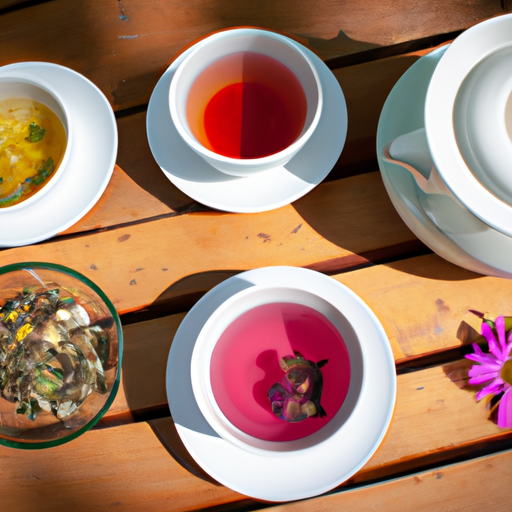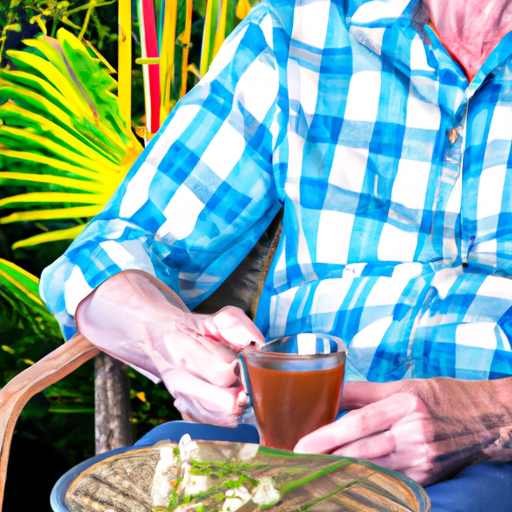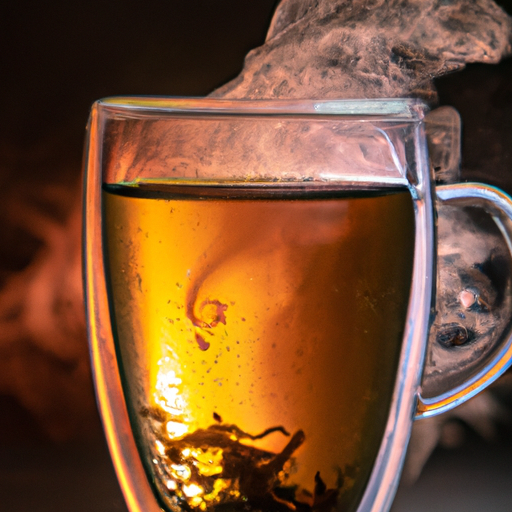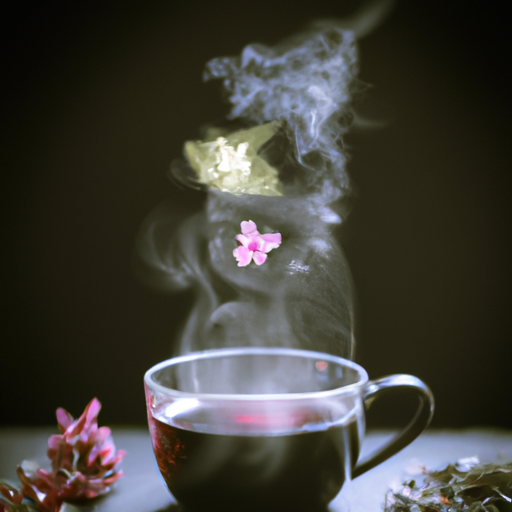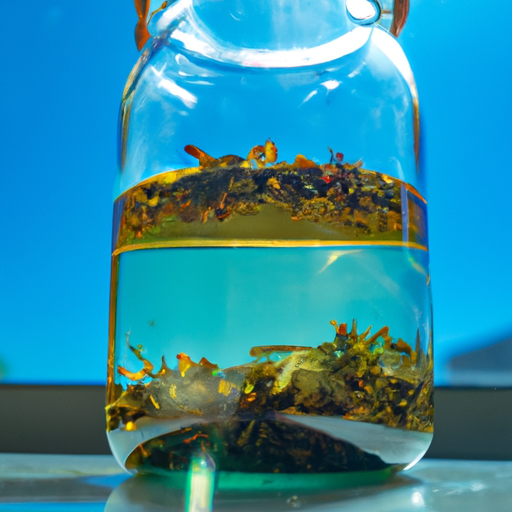Did you realize that around 80% of the global population regularly consumes caffeine? This statistic is quite surprising, considering that caffeine is a stimulant that may lead to jitters, anxiety, and even disturbances in sleep patterns.
If you’re someone who is looking to cut down on your caffeine intake or eliminate it altogether, you might be wondering what alternatives are available. Luckily, there is a wide variety of herbal teas that do not contain any caffeine.
In this article, I will introduce you to some of the most popular options, including chamomile, peppermint, rooibos, hibiscus, ginger, lemon balm, and lavender teas. Not only are these teas caffeine-free, but they also offer a range of health benefits, from promoting relaxation to aiding digestion.
So, if you’re ready to explore the world of herbal teas, join me as we embark on a caffeine-free journey.
Key Takeaways
- Herbal teas such as chamomile, peppermint, rooibos, hibiscus, ginger, lemon balm, and lavender do not contain caffeine.
- Herbal teas offer a caffeine-free alternative to reduce or eliminate caffeine intake.
- Lavender tea, specifically, is caffeine-free and has soothing effects, promoting relaxation and reducing stress.
- It is important to start with a small amount of lavender tea and consult a healthcare professional if there are concerns about potential side effects.
Chamomile Tea
Looking for a caffeine-free herbal tea option? Look no further than chamomile tea! Chamomile tea is a popular herbal tea known for its calming and soothing effects. It’s made from the flowers of the chamomile plant and has been used for centuries for its numerous health benefits.
One of the main benefits of chamomile tea is its ability to promote relaxation and reduce anxiety. It contains an antioxidant called apigenin, which binds to specific receptors in the brain that help induce sleepiness and reduce stress. This makes chamomile tea an excellent choice for those looking to unwind after a long day or get a good night’s sleep.
In addition to its calming effects, chamomile tea is also known for its anti-inflammatory properties. It can help reduce inflammation in the body, which can be beneficial for those suffering from conditions like arthritis or digestive issues.
If you’re looking for some delicious ways to enjoy chamomile tea, there are plenty of recipes to choose from. You can add a dash of honey and a squeeze of lemon for a refreshing twist, or mix it with other herbs like lavender or mint for a unique flavor combination.
Now, let’s move on to the next section about peppermint tea, another popular caffeine-free herbal tea option.
Peppermint Tea
You’ll love the refreshing taste of peppermint tea, which can be a great option for those looking to reduce their caffeine intake. Peppermint tea is derived from the peppermint plant, a hybrid of watermint and spearmint. It has been used for centuries due to its numerous health benefits.
One of the main advantages of peppermint tea is that it’s naturally caffeine-free, making it an excellent choice for those who want to enjoy a hot beverage without the stimulating effects of caffeine.
In addition to being caffeine-free, peppermint tea offers a range of health benefits. It’s known to aid digestion and relieve symptoms such as bloating, stomach cramps, and indigestion. The menthol component in peppermint tea helps relax the muscles of the gastrointestinal tract, promoting smoother digestion. Moreover, peppermint tea has a soothing effect and can provide relief from headaches and migraines.
Peppermint tea is also known for its invigorating flavor profile. It has a cool and refreshing taste with a hint of sweetness, making it a delightful beverage to sip on. Whether you prefer it hot or iced, peppermint tea is a great choice for any time of the day.
Transitioning into the subsequent section about ‘rooibos tea,’ another popular herbal tea that’s naturally caffeine-free…
Rooibos Tea
When you’re craving a flavorful and energizing beverage, rooibos tea is the perfect choice for you. It’s not only naturally caffeine-free, but it also offers a wide range of health benefits.
Here are three reasons why rooibos tea should be a staple in your pantry:
-
Rich in antioxidants: Rooibos tea is packed with powerful antioxidants that help protect your body against free radicals, reducing the risk of chronic diseases like heart disease and cancer. These antioxidants also have anti-inflammatory properties, promoting overall wellness.
-
Supports digestion: Rooibos tea has been used for centuries to soothe digestive issues like indigestion, bloating, and stomach cramps. It can help relieve gastrointestinal distress and improve overall digestive health.
-
Versatile in recipes: Rooibos tea isn’t just a refreshing beverage; it can also be used in various recipes. From rooibos-infused smoothies and cocktails to rooibos tea-infused desserts, there are endless possibilities to incorporate this flavorful ingredient into your culinary creations.
Transitioning to the next topic, hibiscus tea is another caffeine-free herbal tea that offers a unique taste and numerous health benefits.
Hibiscus Tea
Nicknamed the ‘ruby elixir,’ hibiscus tea is a vibrant and flavorful infusion bursting with health-boosting properties. It’s made from the dried petals of the hibiscus flower, and this herbal tea is naturally caffeine-free, making it a great choice for those looking to avoid stimulants.
Not only does hibiscus tea offer a refreshing and tart flavor, but it also possesses a range of potential health benefits. One notable benefit is its calming properties. It’s often consumed to promote relaxation and reduce stress levels. The tea contains compounds that may help lower blood pressure and improve heart health.
Additionally, hibiscus tea is rich in antioxidants, which can help protect the body against cell damage and reduce the risk of chronic diseases. Research suggests that regularly consuming hibiscus tea may also have potential health benefits such as supporting healthy digestion, promoting weight loss, and boosting the immune system. Some studies even indicate that hibiscus tea could have anti-cancer properties, although more research is needed to confirm these findings.
Transitioning to the subsequent section about ginger tea, another popular herbal infusion, ginger tea offers its own unique set of health benefits and a soothing flavor profile.
Ginger Tea
Indulge in the invigorating warmth of ginger tea, as its aromatic blend of spices dances on your taste buds, offering a soothing and comforting experience.
Ginger tea is made from the root of the ginger plant and has been enjoyed for centuries. It has numerous health benefits and a delicious flavor.
One of the main benefits of ginger tea is its ability to aid digestion. It can help relieve indigestion, reduce bloating, and alleviate nausea. Ginger tea also has anti-inflammatory properties, which can help reduce inflammation in the body and ease joint pain. Additionally, it is known to boost the immune system, thanks to its high levels of antioxidants.
Making ginger tea at home is simple. Start by peeling and slicing a fresh ginger root. Add the slices to a pot of boiling water and let it simmer for about 10 minutes. Strain the tea and add a squeeze of lemon or a drizzle of honey for added flavor.
Transitioning to the subsequent section about lemon balm tea, another caffeine-free herbal tea option, you can explore the refreshing and calming qualities of this delightful infusion.
Lemon Balm Tea
Lemon Balm tea is a fantastic herbal remedy that I highly recommend for those looking to calm their nervous system. It contains compounds that’ve been shown to have a calming effect on the body, helping to reduce anxiety and promote relaxation.
Not only does it calm the nervous system, but it also has the added benefit of improving mood and cognitive function. This makes it a great choice for those looking to enhance their overall mental well-being.
Calms the Nervous System
Chamomile tea, known for its soothing qualities, is a caffeine-free herbal option that helps to calm the nervous system. This delightful tea has been used for centuries to relieve anxiety and promote relaxation.
Chamomile contains compounds that bind to receptors in the brain, which helps to reduce feelings of stress and promote a sense of calm. It also contains antioxidants that help to protect the body from oxidative stress.
Additionally, chamomile tea has been shown to improve mood and cognitive function. The natural compounds in chamomile have a positive effect on the brain, helping to enhance memory and focus.
So, if you’re looking for a caffeine-free tea that not only calms the nervous system but also improves mood and cognitive function, chamomile tea is the perfect choice.
Improves Mood and Cognitive Function
If you’re looking to boost your mood and sharpen your mind, sipping on a cup of chamomile tea is like giving your brain a gentle massage. Chamomile tea has been used for centuries to improve mood and cognitive function, and it’s no wonder why. Here are three ways chamomile tea can enhance your mental well-being:
-
Boosts Memory: Chamomile tea contains compounds that’ve been shown to improve memory and concentration. Regular consumption of chamomile tea can help enhance your cognitive abilities and keep your brain functioning at its best.
-
Reduces Anxiety: One of the key benefits of chamomile tea is its ability to reduce anxiety and promote relaxation. The tea contains natural compounds that have a calming effect on the nervous system, helping to alleviate stress and promote a sense of calm.
-
Improves Cognitive Function: Chamomile tea has been found to have a positive impact on cognitive function. It can improve attention, focus, and overall mental performance, making it a great choice for those looking to enhance their cognitive abilities.
Transitioning into the subsequent section about lavender tea, another herbal tea that doesn’t contain caffeine, it offers a range of benefits for both the mind and body.
Lavender Tea
You’ll love the soothing aroma and calming effects of lavender tea, which is caffeine-free. Lavender tea is made from the dried buds of the lavender plant, known for its beautiful purple flowers and sweet scent. It has been used for centuries as a natural remedy for various ailments, including anxiety and insomnia.
One of the main benefits of lavender tea is its calming effects on the mind and body. The aroma of lavender has been shown to help reduce stress and promote relaxation. Drinking lavender tea can help soothe your nerves and improve your mood, making it a great choice for those looking for a natural way to unwind after a long day.
In addition to its calming effects, lavender tea also has potential side effects that you should be aware of. Some people may experience allergic reactions or digestive issues when consuming lavender tea. It’s important to start with a small amount to see how your body reacts and to consult with a healthcare professional if you have any concerns.
Overall, lavender tea is a caffeine-free herbal tea that offers a range of benefits, including its calming effects and potential mood improvement. It’s a great choice for those looking for a natural and soothing beverage to enjoy throughout the day.
Frequently Asked Questions
What are the health benefits of drinking herbal tea?
Drinking herbal tea is like giving your body a gentle hug, with benefits ranging from improved digestion to a boosted immune system. It’s a natural way to support your overall health and well-being.
Can herbal tea help with sleep and relaxation?
Yes, herbal tea can help with sleep and relaxation. It is commonly used for anxiety and stress relief. Chamomile, lavender, and valerian root are popular herbal teas known for their calming properties.
Are there any potential side effects of drinking herbal tea?
Drinking herbal tea can have potential risks, such as allergic reactions or interactions with medications. It’s important to consult with a healthcare professional before incorporating herbal teas into your routine.
Can herbal tea be consumed by pregnant women?
Herbal tea can be consumed by pregnant women, but it’s important to choose safe options. Some herbal teas are considered safe during pregnancy, such as peppermint, ginger, and chamomile. However, it’s always best to consult with a healthcare provider for personalized advice.
How does the taste of herbal tea differ from traditional tea?
Have you ever wondered how the taste of herbal tea differs from traditional tea? Well, herbal teas come in a wide variety of flavors, ranging from floral and fruity to earthy and spicy. They can also have a soothing effect on digestion.
Conclusion
In conclusion, if you’re looking for a soothing beverage to unwind without the jolt of caffeine, herbal teas are the way to go.
Chamomile tea, with its calming properties, is perfect for relaxing after a long day.
Peppermint tea not only refreshes your senses but also aids in digestion.
Rooibos tea, with its rich flavor, is a caffeine-free alternative to black tea.
Hibiscus tea offers a tangy and vibrant taste, while ginger tea provides a warming and invigorating experience.
Lemon balm tea and lavender tea offer a gentle and comforting aroma.
So go ahead, indulge in these delightful herbal teas and let their natural goodness envelop your senses.

